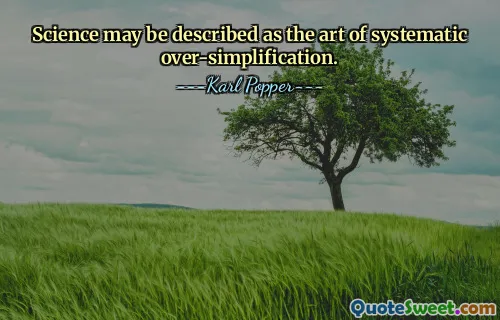Karl Popper was an influential philosopher of science, known for his critical approach to scientific theories. He proposed that scientific progress is not a matter of confirming theories but rather of disproving them through rigorous testing. This principle, known as falsifiability, suggests that for a theory to be considered scientific, it must be testable and capable of being proven wrong. Popper's ideas challenged the traditional view of science and emphasized the importance of skepticism and critical scrutiny in the pursuit of knowledge. In addition to his work on the philosophy of science, Popper also contributed to discussions on politics and society. He argued against totalitarianism and emphasized the value of open societies where ideas can be freely debated. His commitment to liberal democracy was rooted in the belief that societies must allow for criticism and improvement to avoid tyranny. Popper’s stance on social and political philosophy has been influential in shaping contemporary views on democracy and civil rights. Popper’s legacy extends beyond philosophy to various fields including sociology, economics, and even psychology. His emphasis on critical thinking and the iterative process of scientific inquiry makes his work relevant across disciplines. By advocating for a method of conjecture and refutation, he laid a groundwork that encourages ongoing questioning and refinement of our understanding of the world. His ideas continue to inspire scholars and thinkers in their quest for knowledge and truth.
Karl Popper was an influential philosopher of science, known for his critical approach to scientific theories. He proposed that scientific progress is not a matter of confirming theories but rather of disproving them through rigorous testing.
In addition to his work on the philosophy of science, Popper also contributed to discussions on politics and society, arguing against totalitarianism and emphasizing the value of open societies. His commitment to liberal democracy was rooted in the belief that societies must allow for criticism and improvement to avoid tyranny.
Popper’s legacy extends beyond philosophy to various fields including sociology, economics, and even psychology, advocating for a method of conjecture and refutation that encourages ongoing questioning and refinement of our understanding of the world.
More »
Today Birthdays
1955 -
Max Lucado
1946 -
John Piper
1842 -
William James
1907 -
Abraham Joshua Heschel
1887 -
Aldo Leopold
1755 -
Alexander Hamilton
1976 -
Alethea Kontis
1971 -
Mary J. Blige
1825 -
Bayard Taylor
1943 -
Jim Hightower
1885 -
Alice Paul
1923 -
Carroll Shelby
1928 -
David L. Wolper
1954 -
Kailash Satyarthi
1972 -
Amanda Peet
1946 -
Naomi Judd
1970 -
Malcolm D. Lee
1955 -
Christian Marclay
1973 -
Rahul Dravid
1987 -
Jamie Vardy
1942 -
Clarence Clemons
1992 -
Fatima Sana Shaikh
1948 -
Larry Harvey
1930 -
Rod Taylor
